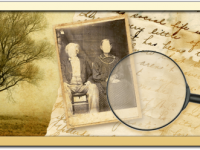
Richard Carpenter (1920-2005) remembers a gathering of Carpenter family in his childhood days, in southern Indiana. An argument broke out among some of them, and his father snarled, “Well, I’m just going to change my name to Medlock, which is what it should be anyway!” The family legend that had been passed down through the generations asserted that John Carpenter (1755-1843) was not actually the father of Levi Carpenter (1810-1883). Supposedly, one of John’s daughters had a baby boy out of wedlock, fathered by a man named Medlock or Matlock. John raised Levi as his own son. In those days, legal proceedings for guardianship or adoption were often neglected, especially in places like rural Kentucky. No court record can be found to verify the legend.

New DNA technology has been developed in recent years, and provides a helpful tool for genealogists. The theory that Richard’s great-great-grandfather, Levi Carpenter, was fathered by someone other than a Carpenter, could now be tested. Should his name be Medlock or Matlock, instead of Carpenter? Is the old family story true? His daughter ordered the test kit and had it sent to Richard’s home in May 2004. His wife did the simple inner cheek swab and sent the test kit back to the DNA lab. Their test subjects have submitted hundreds of thousands of samples, and they already had quite a few Carpenter samples. The Carpenter test results were categorized into groups of particular clans of Carpenters who came from certain geographical areas. Richard’s particular branch of Carpenters are known to have come from the Botetourt County, Virginia area, and were called the ‘Jacksons River’ group in the DNA database. The Y-DNA, which only males have, is passed down through the generations from father to son with a very low rate of mutation. Richard’s Y-DNA did not match any of the samples from documented descendants of the Jacksons River Carpenters, not even close. This supports the theory that there was indeed an illegitimacy, but his DNA did not match with any samples from men named Medlock or Matlock either! It did match sixty-seven for sixty-seven markers or alleles with a Greer descendant, which is very intriguing. There were Greers living in Green County, Kentucky in 1809, the year of Levi’s conception, but which one frolicked with which one of John Carpenter’s daughters has yet to be determined. Perhaps Richard’s name should be Greer, but he is still proud to go by Carpenter.
The use of DNA studies in genealogy can answer questions, or it can raise more questions! Let us help you discover if a DNA test might solve your difficult genealogy problems.



